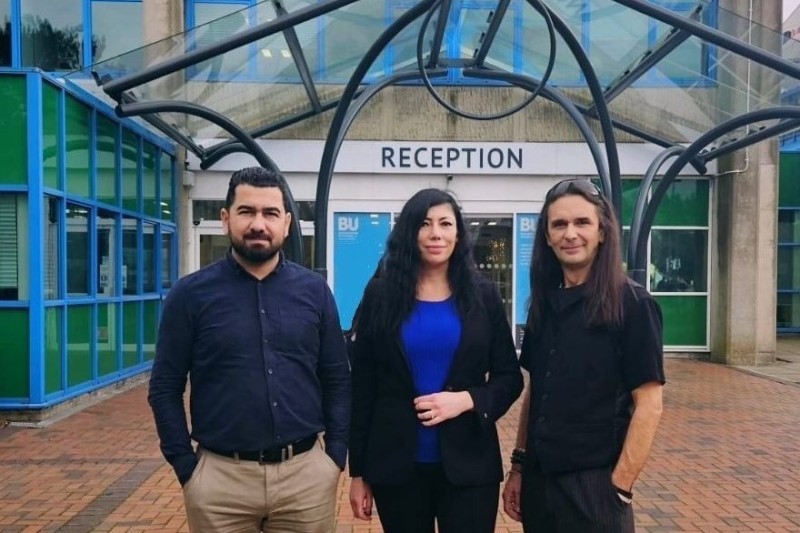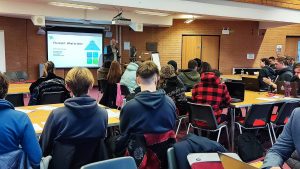We’ve a lot to cover this week as the new lockdown seems to have inspired policy wonks to publish!
Input from the Government has informed how students should travel home safely for Christmas and the Education Secretary wants all the Skills answers.
Skills reform
Education Secretary Gavin Williamson has written to Stephen van Rooyen (Sky CEO) who Chairs the Skills and Productivity Board. The Board provides a focus on the skills areas the Government should attend to within industry and also provides independent labour market advice. In his letter Gavin confirms the Board’s priorities for the year ahead:
Under your leadership the board will play a central role in driving forward the government’s ambitious plans to upgrade the skills system – including improving higher technical education – and boost productivity. I know we agree on the importance of ensuring that courses and qualifications on offer to students across the country are high-quality, are aligned to the skills that employers need for the future and will help grow our economy after the coronavirus outbreak.
To this end, you and I have agreed the board will prioritise the following questions over the next 12 months:
- Which areas of the economy face the most significant skills mismatches or present growing areas of skills need?
- Can the board identify the changing skills needs of several priority areas within the economy over the next 5-10 years?
- How can skills and the skills system promote productivity growth in areas of the country that are poorer performing economically?
The Minister wants quick answers – I would encourage you to prioritise the accumulation of evidence that can have the greatest impact, to build on the excellent analytical work that has already taken place inside and outside government, and to focus on actionable insights that we can use to reform our skills system… I welcome the board’s advice on what ‘good’ looks like across the globe
The letter also confirms the appointees to the Board of six leading skills and labour market economists:
- Arun Advani – University of Warwick: Assistant Professor, IFS Fellow
- Claire Crawford – University of Birmingham: Reader in Economics
- Andrew Dickerson – University of Sheffield: Professor of Economics and Director of Sheffield Methods Institute
- Ewart Keep – Oxford University: Emeritus Professor in Education, Training and Skills, Department of Education Oxford University
- Grace Lordan – LSE: Associate Professor & Founding Director of the Inclusion Initiative
- Sir Christopher Pissarides – LSE: Regius Professor of Economics and Nobel laureate
Admissions: Post Qualification Offers (PQO)
This is the surprising “big news” this week. Surprising from a timing point of view, at least. We need to get our acronyms right to start with. A lot of talk for years has been about PQA – post qualification admissions. However, it seems that we are now talking about PQO – Post Qualification Offer-making – i.e. students apply in a way not dissimilar to now, but offers are only made when results are available. So no more clearing – because essentially everyone is in clearing. It might also mean an end to unconditional offers in most cases (remember that these are already banned by the OfS in most cases, for the time being). Most importantly for the government, and those concerned by unfairness inherent in the system, it means an end to predicted grades. Although perhaps not……
UCAS triggered media excitement on Monday morning…
And on Friday, the UUK Fair Admissions Review – comes out in favour of PQO from 2023 subject to full consultation.
Other highlights:
- The ending of ‘conditional unconditional’ offers
- Guidance on the acceptable use of unconditional offers
- A new code of practice to maintain standards
- Greater transparency, consistency, and standard indicators to support contextual offer-making
Guardian Friday– Admissions reform – University leaders have given their backing to a radical overhaul of admissions policy which would mean UK students would only be offered places once they have their A-level results. The long-awaited reform aims to make the system fairer by eliminating the use of predicted grades, which are often unreliable, and will bring the UK into line with other countries, possibly as early as 2023/24.
We think it is a bit early to say that university leaders have backed it – this is a set of recommendations following a review which have yet to be consulted on…….
Stakeholder reaction to UUK proposals:
Emma Hardy MP, Labour’s Shadow Universities Minister, said:
- “The university admissions system has let students down for years, and Labour have long campaigned for reform.
- “University admissions must provide greater clarity and opportunities for applicants, in a way that is fair to all; whatever their backgrounds.
- “The Government must now listen to universities, colleges and schools and deliver a system that is fair and transparent.”
Chris Millward, Director for Fair Access and Participation at the Office for Students, said:
- ‘A fair and robust admissions system is essential for ensuring equality of opportunity for all students, and must help applicants from all backgrounds choose and gain admission to the best possible course and university or college for them.
- ‘There is evidence that disadvantaged students could benefit from a system where offers are made on the basis of grades achieved rather than predicted grades, particularly in applications to the most selective universities. Post-qualification admissions could also help improve transparency in contextual admissions and other entry requirements. But it is not a magic bullet for fair access.
- ‘So, we will consider all of UUK ‘s proposals carefully, including the proposed move to post-qualification admissions, and continue to work with partners across the higher education sector to improve the admissions system – that means identifying how to remove barriers to disadvantaged applicants, promoting transparency and clarity about the admissions process and ensuring the system works fairly for all.
- ‘There is widespread recognition that aspects of the current system are not working. For example, research suggests that students from disadvantaged backgrounds are more likely to receive under-predicted A-level grades. We have also temporarily banned ‘conditional unconditional’ offers during the pandemic due to the pressure that they can put on students to make choices which may not be in their best interests.
- ‘As Universities UK proposes today, we have also called for universities to make a deeper commitment to contextual offer making. We know that school results are not achieved under equal conditions, and it is crucial that universities and colleges recognise candidates’ potential when making admissions decisions. That’s what they have committed to do through the access and participation plans agreed with OfS.’
Is this a priority?
- Key areas of focus announced for the OfSthis year included admissions and recruitment including marketing and inducements
- Government focus on fairness and choice: We expected this government may go further on choice and fairness by pushing hard on post-qualification admissions. Gavin Williamson does not like unconditional offers, university marketing or clearing and the government is convinced that there is mis-selling.
- As we reported in September, Nicola Dandridge (OfS) presented at the Wonkhe event, the Secret Life of Students and said that the OfS admissions review that was launched before lockdown would remain on pause to allow universities to deliver the 2021 cycle first (and tackle any difficulties that arise).
And what did UCAS say? In Monday’s announcement they set out two “options for reform”.
- Under a post-qualification offers model, all students, including those on technical and vocational routes, would receive offers from their chosen universities and colleges on the same day, after getting their final qualification results in the summer. This means students would not be giving up a potential place until their grades were known, and would retain the long selection window in the prior months, which allows time to support students with disabilities and those from disadvantaged backgrounds.
- Apost-qualification application model will be put up for discussion, which sees all students apply and receive offers after receiving their qualification results. To allow sufficient time for support from teachers, as well as applications to be submitted, assessed, and offers made and accepted, university term would need to begin in January.
There is no more detail: “Full details on the two models being proposed and how UCAS will collect and review feedback on them will be published in the coming weeks.”
UCAS Chief Executive Clare Marchant notes that it is “It is absolutely crucial though that we limit any unintended consequences of such major change” and the report will be published alongside a mechanism to collect and review feedback from the sector. The Guardian and the Independent cover the announcement, while the Times publishes letters from Lord Blunkett, Nick Hillman and others on the proposed reforms.
Wonkhe:
In The Times, pupils could apply to university after A-level results day, an opinion piece says that now is the time to reform university admissions and an editorial says that universities should not make offers until A-level results have been received.
Admissions : Access to HE: Wonkhe cover the new report from AccessHE focuses on the impact of the pandemic on those applying for a higher education place in 2021. Assuming that students drop one grade from what they would otherwise have attained (for example D to E at A level) 5,000 applicants in London (75 per cent of whom are from BAME backgrounds) would miss out on HE study. England-wide, this could be as many as 27,000. There’s a position paper from NEON and the NUS calling for a later UCAS deadline and a national taskforce.
Research news
SURE: You’ll recall that Government had a bail out scheme of sorts for some universities research functions where Covid has caused significant disruption. It is now called the Sustaining University Research Expertise (SURE) package and Government have released a notice on the fund highlighting that UKRI will published detailed guidance shortly. Research Professional unpick the scheme here.
Some basic points on the fund:
- It is to address short term losses in research related income (all funds received have to be spent on research or KE activity)
- The government will cover 80% of a university’s losses from international student income (for 2020-21) or the value of non-publicly funded research activity in that university (whichever is the lesser), supplemented with “a small amount” of government grant.
- The loan interest rate 0.55% over a 10 year repayment period
- The deadline to apply is mid December (even though the full guidance isn’t out yet) and payments to providers will made by 31 March 2021.
- There are other conditions too, such a pay restraint, and RP retain their sense of humour in describing the condition: there would also seem to be big disincentives from taking out a loan for any university that prizes its autonomy. As Darth Vader told Calrissian, “I am altering the deal. Pray I don’t alter it any further.”
ARPA: The Commons Science and Technology Committee held a session on a new UK research funding agency (ARPA) they continued to hear evidence on how the proposed UK ARPA will fit into the existing research landscape, with Amanda Solloway, Ottoline Leyser, and Sarah Hodgetts among the witnesses. Wonkhe report on the session:
- UKRI chair John Kingman stressed the need to balance the desire to adequately fund any potential UK Advanced Projects Research Agency (ARPA) with the usual accountability when spending public money. UKRI chief executive Ottoline Leyser said she does not see proposals for any new funding body as an implicit criticism of UKRI, but one approach among many, within a context of rising government funding of research. Science minister Amanda Solloway said that while the focus of ARPA has yet to be decided, she wants it to be led by scientific merit rather than by government. You can watch the full session on Parliament TV.
Dods have a more comprehensive summary of the session here.
Arts & Culture: Research Professional (RP) report that:
- Research England is announcing £1.1 million in funding for a National Centre for Academic and Cultural Exchange to facilitate knowledge exchange between universities and the UK’s arts and culture industries. The NCACE will be run by the Culture Capital Exchange. The virtual centre will focus on showcasing the social, cultural, environmental and economic impacts of knowledge exchange in the arts, with plans to promote impacts in health, place-making, climate change and technology.
RP are critical of the Centre stating its impact is based on anecdotal evidence. More here.
Security Threats: The Centre for Research and Evidence on Security Threats (CREST) has received an additional £5.3 million to continue behavioural and social science research into security threats to the UK. Originally launched in October 2015 CREST is reported to have drawn collaboration from 140 researchers within 35 higher education institutions and small and medium-sized enterprises for research and engagement to add value to security training, practices and policies.
Doctoral Students: Wonkhe report that UKRI has advised funded doctoral students to discuss with their supervisors adjusting their projects to complete qualifications while funding is available. The research council will be making an additional £19m available to support students who find it more difficult to make adjustments – particularly those in their final year and those with ongoing support needs. This announcement comes alongside the publication of a review of student support, which found that 92 per cent of final year students asked for an extension, with an average length of 46 months. And there’s a Wonkhe blog on the topic.
Digital: Jisc has announced the formation of a digital research community which will explore how technology and innovation can help improve research practice. Researchers, research leaders, research managers and other professionals in the field, such as developers, software engineers, and library and IT staff can join.
Students Engage! The Future of Engagement at Universities from HEPI covers blending public engagement into the student university experience.
R&D Taskforce recommendations: The National Centre for Universities and Business (NCUB) have published Research to Recovery a R&D taskforce report. In the report, business and universities set out a collective vision for a future driven by collaboration through research and development.
The report recommendations include:
- A refresh of the Industrial Strategy that places research and innovation as its engine. By backing businesses innovation, the Government will help create a more resilient, competitive and productive economy.
- The establishment of a network of ‘Innovation Collaboration Zones’ across the UK to aid the levelling up agenda. The Government, with UK Research and Innovation, should create simpler mechanisms to support businesses to innovate, and to galvanise industry and academia; the Times has the story.
- The creation of a Global Collaboration Fund to encourage universities and businesses to pool their strengths to attract inward investment, attracting investment from businesses in the UK and overseas.
- A widened remit of the Office for Talent to help grow and deliver domestic talent, alongside attracting global talent. A coordinated, cross-cutting approach needs to be taken to develop, upskill, retain and retrain domestic talent.
Preventing abuse: HM Revenue & Customs have published a policy paper on preventing abuse of R&D tax relief for SMEs. It limits claims to £20,000 plus 300% of its total PAYE and National Insurance contributions liability for the period.
Parliamentary Questions
- An oral parliamentary question (so slightly longer content) on the recent steps supporting the growth of innovation and new technologies.
- The Government is open to participation in Horizon Europe if a fair and balanced deal can be reached. Alongside this, BEIS is working with the Devolved Administrations to develop credible options should alternative schemes be required. Funding for any continued participation in EU research and innovation Programmes or EU replacement schemes is subject to allocations at the Spending Review. More here.
- UKRI’s proposed Open Access policy. And Rights to Retention.
- Steps to ensure that PhD students from the EU wish to study in the UK after the increase in student visa costs from January 2021.
- Ensuring that the UK life sciences sector continues to have access to (a) research funding and (b) collaborative working opportunities with European partners after 31 December 2020.
- Government is analysing responses following its survey on the R&D roadmap.
And this one won’t be responded to for two weeks (so it’ll fit within the timing of the Spending Review without giving anything away) but it is worth noting it now:
Exams (GCSE, AS & A level)
Wales: Following an independent review panel Wales has cancelled GCSE, AS & A level exams, due to the ongoing pandemic, replacing them with coursework and assessments. Some assessments will be set and/or marked externally, however they will be delivered in the teacher supervised classroom environment during the second half of the Spring term. The assessments will feed into the nationally derived centre-assessed grades. The decision will also allow schools to continue teaching throughout the summer term (BBC). TES also covered the story.
The BBC report Welsh Education Minister Kirsty Williams said:
- The well-being of learners and ensuring fairness across the system is central in our decision making process.
- We remain optimistic that the public health situation will improve, but the primary reason for my decision is down to fairness; the time learners will spend in schools and colleges will vary hugely and, in this situation, it is impossible to guarantee a level playing field for exams to take place.
- We have consulted with universities across the UK and they have confirmed that they are used to accepting many different types of qualifications.
- And it remained a “highly challenging year” but the announcement would remove pressures from learners and provide “clear time for teaching and learning”.
Number 10 have confirmed that exams in England will still go ahead. Although Wonkhe have this:
- Chair of the Ofqual “Recovery Committee” Amanda Spielman has suggested that England may only hold examinations in core subjects next year. She told the House of Commons Education Committee that cancelling exams would not be a “sensible default route”, but that this year’s A level candidates would face difficulties in catching up with their learning. You can watch the hearing on Parliament Live. The Financial Times and Schools Week have the story.
Exams in Northern Ireland will also go ahead but the number of exams per subject will be reduced (BBC).
The Education Policy Institute has published a report and recommendations on the 2021 exam series. It finds the Government doesn’t have a credible plan B should exams not be able to go ahead and sets out a number of actions that would mitigate the risks for students. It also encourages HE providers to make full use of contextual admissions.
Committee: Ofqual partiality questioned & 2021 exams: The Education Committee has written to Gavin Williamson (Education Secretary) to highlight serious concerns about the independence, accountability and transparency of the exams regulator Ofqual. The Committee has called for proper planning to be put in place to ensure students in England are able to sit exams next year. The letter also sets out the Committee’s findings and recommendations following the problems which resulted from the cancellation of this summer’s exams due to the coronavirus pandemic.
Rt Hon Robert Halfon MP, Chair of the Education Committee, said:
- The fallout and unfairness from the cancellation of this summer’s exams will have an ongoing impact on the lives of thousands of families. But such harm could have been avoided had Ofqual not buried its head in the sand and ignored repeated warnings, including from our Committee, about the flaws in the system for awarding grades.
- A lack of transparency and independence at Ofqual meant opportunities to raise alarm bells were missed. Ofqual should have acted to protect the futures of our young people.
- There are arguments to be made for and against Ofqual remaining independent, and for its duties being brought inside the Department for Education directly under ministerial control. It must be absolutely clear to all where accountability lies. What is not acceptable is a half-way house position where lines of accountability for standards are blurred.
- Both Ofqual and the DfE must learn hard lessons from this summer’s exams controversy and move swiftly to ensure exams can take place next year in one form or another. They must ensure a level playing field for those from disadvantaged backgrounds who have struggled during Covid. The catch-up fund and pupil premium should be used to help those left behind or at home due to Covid issues.
- Ofqual and the DfE must also make sure there is no repeat of the unfairness faced by pupils should the pandemic continue to impact on learning. Young people have already been among some of the hardest hit these past few months and they must be properly supported to ensure they get the future their hard work deserves.
Wonkhe put it succinctly: the regulator either seemed to ignore evidence presented to it or acted in such a way as to bring itself in line with ministerial wishes, blurring lines of accountability
Dods diplomatically say: …it is clear that Ofqual recognised the problems with the model of awarding grades yet failed to raise concerns about its fairness. Instead they simply followed the ministerial direction and hoped for the best— calling into question its independence.
Exams 2021: The Committee says:
- Exams must go ahead in 2021 and robust contingency planning should be put in place as soon as possible to ensure this can happen.
- There should be careful consideration on whether to continue with the full curriculum should particular local circumstances or lockdowns impact student learning. Any decisions must be informed by an assessment of the learning loss that has occurred since March across schools and how this has varied across the country.
- There must be a level playing field for exams for those from disadvantaged backgrounds, who have struggled with Covid. Catch-up funding and pupil premium should be used to help these left behind groups.
- There will need to be urgent consideration of what approach should be taken in light of the grade inflation that has occurred this August and how standards can be maintained.
GCSE curriculum – gateway to university not skills?
The House of Commons Education Committee held an oral evidence session on Left Behind White Pupils from Disadvantaged Backgrounds (click Transcripts to download the full session content). Below are the elements most relevant to universities:
- Dr Alex Gibson (Senior Research Fellow, University of Plymouth) makes a plea for the use of the LSOA (lower layer super output area) to understand local deprivation. He states he found it: incredibly valuable in trying to explain variations in performance or access to university. …Once you are able to include that [LSOA] data, for instance the IDACI score…that is the number of children in each area living in income deprivation—you are able to bring in a lot more information. Once you have that, the significance of free school meal status actually drops away. Using the national pupil database, which is one of the most remarkable databases we have, allows you to pull in an awful lot more data than just free school meals, so I would call for that to be used at every opportunity.
- Henri Murison (Director, Northern Powerhouse Partnership): …we have made GCSEs a preparation for A-levels, which are a preparation for university. I understand why A-levels are a preparation for university, because they are predominantly taken by people going to university, but GCSEs are supposed to be a gateway qualification for all young people to get on. The reality is they are not an accessible qualification for people who do not have lots of experience in the family of people who have gone to university. Schools can do an awful lot to open up those qualifications, but the reality is we need to have a fundamental look at what we are asking kids to study, because I do not think employers are very interested in what they include either.
- Ian Mearns MP, Education Committee member: In a nutshell, are you saying that the curriculum that is being provided is only appropriate for the 50% of youngsters who are destined for university?)
Henri Murison: Yes
- Tom Hunt MP (Education Committee member):
- …There has been some criticism of the education system over the past few decades that there has not been enough focus on technical education apprenticeships. It has been very much a 50% target for university, et cetera.
- Do you think it is a problem for some because, almost regardless of whether you want to go to university or whether you want to go on to a good quality apprenticeship, you have to do reasonably well in your GCSEs, for example? Do you think there has been a bit of a problem that, for many, they have looked at university and said, “That seems to be the only thing we are hearing about at school: we need to go to university. We do not really think university is a route for us or for me. It is not achievable for us to get there and there is not really anything else”?
- There is not really a sense of there being multiple pathways. There hasn’t been enough to promote good quality technical education and apprenticeships. Maybe if there had been there would be more of an incentive and a driver for children from low-income backgrounds, who perhaps do not want to go to university but who would be attracted by that technical route, to do better at GCSEs, for example, and that gap would not be so large.
- At Q109 tracking individuals and their economic success from all backgrounds is covered – noting that the only longitudinal tracking that is conducted is on individuals who do go to university.
Access & Participation
Wonkhe report: The Department for Work and Pensions (DWP) unlawfully prevented thousands of disabled students from claiming benefits for essential living costs for seven years, the high court has ruled. It found that the department had rejected students’ claims for universal credit without allowing them to undertake a work capability assessment (WCA), an unlawful refusal which Disability Rights UK has estimated could have impacted over 30,000 disabled students.
Piers Wilkinson, the former NUS disabled students’ officer said “It is imperative that the government publicly recognise the result of the court case, and apologise for the extra hardships they caused to the thousands of disabled students the government denied and ignored”. Despite the decision, disabled students making a new claim for universal credit will not be able to rely on the court ruling – Work and Pensions secretary Therese Coffey changed the regulations on 3 August, the next working day after she told the court that she would not be defending the judicial review.
- Wonkhe report: The Times has an opinion pieceon how a university degree does not automatically lead to social mobility.
- OfS have a blog on Tackling differential outcomes for underrepresented students in higher education based on the Addressing Barriers to Student Success (ABSS) projects. Case studies are provided. The summative evaluation of ABSS (issued last week) is here. OfS report that the approaches and interventions used in the projects are highly transferable, and it has led to accelerated sharing of what works and the roll-out of innovative solutions to a range of providers. It finds that:
- Inclusive teaching led to increased student confidence, higher attendance levels and higher grades
- Technology can play an important role in providing an inclusive environment
- Enhanced student support led to raised confidence and resilience and improved staff understanding and confidence in supporting students from underrepresented groups
- 1-to-1 support was popular with students from lower participation areas, disabled students and those disclosing mental health conditions
- Buy-in from senior leaders was important, it has a greater impact and chance of future sustainability.
Parliamentary Questions:
Social Mobility Index
The Social Mobility Foundation has published its annual Social Mobility Employer Index which identifies the top 75 UK employers who have taken the most action on social mobility. It ranks the UK’s employers on the actions they are taking to access and progress talent from all backgrounds. It highlights the employers doing the most to change the way they find, recruit and progress talented employees from different social class backgrounds.
This year’s Index highlights that some sectors of the economy – law, public sector and financial services – have made positive strides to improve social mobility in the workplace, but overall progress is too slow. The charity is calling on those sectors which have benefited most from the Covid-19 pandemic, especially major tech, gaming, or pharmaceutical companies, to make a public commitment to social mobility in 2021. None of these sectors are represented in the Top 75 employers.
Alongside the launch of the Index, their chair, Rt. Hon Alan Milburn issued a rallying cry for business to do more to improve social mobility in the wake of Covid-19 or risk a lost generation.
Key findings taken from the report:
- Despite the government focus on levelling up, only 36% of businesses are setting social mobility targets within their organisation despite 85% of respondents feeling their clients care about the social class mix of their workforce
- Tech companies have seen profits soar during Covid-19. The combined post-tax profits of Alphabet, Amazon, Apple and Facebook have grown by $39bn during Covid-19. None of the tech giants entered the Index
- Many businesses are not being transparent about who they employ with only 29% of entrants publishing socio-economic background data on their workforce
- Only 11% of businesses track if they have a class pay gap despite the Social Mobility Commission finding that those from working class background face a 7% pay gap in Britain’s professional and managerial occupations compared to their peers from better-off backgrounds
- In law, a sector which received significant submissions for four years, there appears to be an unwillingness to recruit outside of Russell Group Universities. 84% of legal firms graduate intake was from a Russell Group university
- However, it is positive to see employers investing more heavily in employee development, with 48% of organisations offering buddying and mentoring support (up from 30% in 2019) and supporting the creation of networks of employees from similar backgrounds up at 40% (from 26% in 2019). This progress is welcome given the importance of peer support for career progression. This work could be enhanced by diversity awareness training with a focus on social mobility – only 34% of organisations currently offer this which is unchanged from 2019.
Augar: The long awaited response to Augar may still be delivered during the Spending Review. Lord Parkinson mentioned it this week with some ominously odd phrasing: The government is carefully examining the Augar Report and its recommendations as part of the wider Post-18 Education Review. We are considering a response alongside the Spending Review, with a view to providing certainty to providers and students.
Fees
The Government responded to the latest tuition fee related petition – Lower university tuition fees for students until online teaching ends. In essence, they continue to maintain it is a matter for individual universities.
However, on Monday (16 November) there will be a Commons debate on tuition fees (as is required when a petition reaches over a certain high signature level threshold) and a DfE Minister will be present at the debate to respond on behalf of the Government. (The Commons Library is briefing members – here.) The debate will be based on all 5 petitions which, taken all together, received over 980,000 signatures.
You’ll recall the Committee investigated the fee petitions through an inquiry and issued a report during July calling for the Government to take urgent action and review the support for universities and students in the face of the “greatest challenge they have faced for generations”. Receiving a reasonable standard of education and the disproportionate impact of remote learning on certain groups (e.g. disadvantaged, disabled students, those requiring practical tuition or specialist equipment) were noted as important factors.
In its response to the Committee’s report, the Government accepted that students should be able to take action if they are unsatisfied with their university’s response to the pandemic. However, they rejected the Committee’s recommendation for a new centralised system which enables all students to easily seek a full or partial refund of their tuition fees, or to repeat part of their course.
The forthcoming mini Spending Review, unfavourable responses to parliamentary questions and Monday’s debate into tuition fees has the Russell Group on edge. Wonkhe report:
- The Russell Group has published a briefingfor MPs on the sustainable funding of universities in the group. It calls on parliamentarians to ensure students and universities are provided with a “cast-iron guarantee” that if fees are cut in any Augar review response, that teaching grants cover the funding shortfall in full. It also calls for future demand for higher education places to be met in full.
Existential questions: value for money, the role of universities
Plenty from HEPI this week:
- Value for Money: A Risk, Wrapped in a Mystery, Inside an Enigma – on value for money, excerpt: Lamentably, there is no easy or fool-proof way of measuring value for money and whichever metrics-paved alley you wander down, the inevitable end results will be that you create some behaviours you want and some you may not want. To draw an analogy, you weigh yourself, measure your height and calculate your body mass index, the result is not good. This leads you to decide to embark on a weight loss programme. You weigh yourself every week, you lose weight but hate eating all that rabbit food and cutting out the booze and end up depressed. Weight loss might be good but depression is bad. Any metrics-based system could end up producing unintended consequences that the Government and universities do not want… A tricky problem lies ahead for the Government managing a spiralling national debt – and the escalating cost of higher education does not help matters.
- Universities have always had a civic role to play, COVID has made that role even more important
- Nick Hillman (HEPI Director) wrote for Conservative Home setting out Three options for higher education. Less support for students, fewer of them – or else they pay more
“The Treasury was happy to countenance a big expansion of university finance when it did nothing to blemish its scorecard in reducing the deficit. It will take a sterner view once the actual costs show up in the budget deficit.” [Paul Wallace, Prospect.]
Once again, the Government is facing three options: providing less money per student through lower fees and loans, which would drive some universities to the wall; reducing student places, just as the number of school leavers is about to start a decade-long growth; or tougher student loan repayment terms, which would mean paying a little more. None of these options is palatable.
If it were down to me, I wouldn’t cut education spending at all. The triple whammy of Brexit dampening down skilled migration to the UK, economic change wrought by the pandemic and higher unemployment among lower skilled people in the coming recession mean we should be investing as much as we can in all types of education. More education is always better than leaving people to build blank spaces on their CVs.
Yet if the higher education sector must take some further pain in the spending review, then tougher student loan repayment terms of the sort in place in other countries and of the type recommended by the Augar panel is a better place to start than pushing universities to the brink or blocking aspirational learners from enrolling in higher education.
HEPI’s big ticket item this week is on the Graduate pay gender gap which looks at how the graduate gender pay gap changes over time tries to explain its persistence. Findings:
- The overall graduate gender pay gap is not accounted for by subject of study, type of university attended, prior attainment, social background or ethnicity. Men appear to be more willing to be geographically mobile, which is likely to enhance their career prospects, but it is unlikely that increasing the mobility of women would significantly reduce the difference in pay.
- Men appear to be more focused on their career search than women: they begin their career planning earlier during their time at university, make more applications and are less likely to give up once they have begun an application. They also display more confidence – perhaps overconfidence – and are more speculative in the jobs they apply for.
- On the other hand, women are more likely to be offered a job once interviewed and are less likely to be unemployed on leaving university. This may in part be because they are more efficient in their job seeking; but it could equally reflect the fact that they are less ambitious in the jobs they apply for.
- Women are more likely to work in part-time employment, both during and immediately after their degree than men; whereas men are more likely to undertake an internship during their degree, possibly providing them with an advantage when applying for jobs.
- There are differences in attitudes to employment. For a higher proportion of men than women, a high salary is the mark of a good job. On the other hand, women are more likely to look for job security, work-life balance, a good company culture and a job which enables them to contribute to a cause they believe is meaningful.
- Men and women are equally satisfied in their work, despite women being less well paid on average.
Among the recommendations are:
- higher education institutions should promote information about the graduate gender pay gap, so students are empowered in their career planning to make the best decisions for their circumstances;
- universities should make particular efforts to help female students undertake internships;
- employers, working within current equal opportunities legislation, should make particular efforts to provide internship and networking opportunities for women; and that
- the relative pay of male and female graduates should be included among the indicators of ranking bodies.
- given the gendered impact, the Government, ranking compilers and others should not use comparative earnings as a measure of the worth of programmes or the quality of institutions.
Shadow Universities Minister, Emma Hardy MP, commenting on the report: This report shows that the government’s desire to judge university performance on graduate income is deeply flawed. The government ending it [presumably here she means gender pay difference] cannot be the job of universities alone.
Student / Staff Engagement
Advance HE published their 2020 UK Engagement Survey of student and staff engagement between Feb and June 2020. They report:
- Students surveyed since the spring lockdown report higher levels of engagement in four out of seven areas. Most notably, there is higher engagement in partnering and interacting with staff, two of the areas of engagement where students have reported generally less positively than other aspects.
- Students responding during lockdown are in fact 2% less likely to have considered leaving their course, which is a positive endorsement of how they have been supported, as well as how they have adjusted and adapted to learning under lockdown.
- In new analysis, students who live away from campus and/ or other students show high levels of engagement which indicates that geography and living arrangements do not need to be a barrier to the quality of learning.
Overall engagement:
- 89% of students reported finding their course challenging and 78% reported high levels of critical thinking
- ‘Staff student partnership’ and ‘interacting with staff’ results remain consistent with recent years at 42% and 36%, though in the period of lockdown these improved to 45% and 38% respectively.
- Overall engagement measured by ethnicity of UK domicile students
- BAME students again reported higher level of engagement than White students in every measure.
- The 2020 findings point clearly to students from BAME backgrounds putting in a significant amount of time and effort into their learning; for example,
- in engagement with ‘Research and Inquiry’, BAME students reported engagement levels of 71%, while White students reported 66%;
- in engagement in ‘staff student partnership’, the figures are 46% and 40% respectively.
- In terms of retention, students surveyed this year report being marginally less inclined to consider leaving than last year: 27.4% in 2019 and 26.5% in 2020. A breakdown by pre- and during lockdown responses, shows students are less inclined still to consider abandoning their studies: 26.9% ‘pre’ and 24.9% ‘during’.
- In a new area of analysis for 2020…how students’ living arrangements and commuting distance links with levels of engagement. There appears to be no detrimental impact of a long commute on how a student engages or develops.
- Likewise, living alone and/ or away from other students is actually linked with slightly higher levels of engagement or development than the more traditional model of living close to others.
The analysis shows that age appears to be a key factor in this, with older students – who tend to be those living far away from campus and not with other students – revealing that their levels of motivation and organisation can overcome some of the potential barriers posed by distance or circumstances.
Wonkhe report: Students who took the survey during lockdown also report much greater time spent caring for others and working for pay, and less time in scheduled teaching.
- Students reporting caring responsibilities: 26% in 2019 to 31% in 2020, and 45% specifically during the lockdown period.
Graduate Recruitment
The Institute of Student Employer’s annual recruitment survey highlighted that employers hire back 50% of their former interns and placement students. Also despite efforts to move internships online during Covid there were 29% less short-term internships and 25% less placements than in 2018/19. The decline was not evenly spread across the economy, and in all sectors apart from legal, employers are expecting placement opportunities to decline – most dramatically in the retail, charity and built environment sectors.
There’s a good internship blog on Wonkhe by Tristram Hooley of ISE, he states: So far government employment policy has pretty much ignored higher education students and graduates altogether. There is a need for this to be addressed as the recession deepens.
As the survey sits behind a paywall here is Wonkhe’s coverage: The Institute of Student Employers’ annual survey of graduate employers finds tough times for graduate recruitment, with the number of graduate jobs dropping by 12 per cent in 2020, and further reductions expected next year. Sectors worst affected are retail and fast moving consumer goods, which has seen a 45 per cent reduction, while by contrast the charity and public sector has increased recruitment by four per cent. An immediate challenge for universities is widespread reduction of employers offering internships and placements – which could potentially affect promises made to students applying for sandwich courses and courses that include a placement as part of the offer. The Guardian has the story.
Meanwhile: The National Centre for Universities and Business (NCUB) has called on the government to offer more support for graduates looking for employment, following the release of Office for National Statistics data showing that 13.6 percent of those between 18 and 24 are currently unemployed. [Wonkhe.]
i News covers polling of business leaders by YouGov, which says that more than half of them do not consider a degree important when hiring staff.
Finally, the Office for National Statistics (ONS) have released their latest Labour Market Overview covering July – September 2020.
- Unemployment among 16-24 year olds is now at 14.6%, with the number of unemployed young people rising to around 602,000 – up from 581,000 in the last data release.
- Youth employment is now at a record low of around 3.5 million, and the employment rate for young people now sits at 51.4%.
- There has been a record high number of redundancies leading up to September, increasing by 181,000 this quarter.
Covid – Student Migration
The Government have released the guidance for students to travel home at the end of the term while controlling Covid-19 transmission risk. The Government’s press release (which is more readable than the guidance) is here, the written ministerial statement is here and the OfS Student Guidance is here. The guidance has UK students observe the national lockdown then travel home on staggered departure dates between 3 and 9 December following mass Covid testing on campus. The exact departure dates will vary from between individual institutions and will coincide with the cessation of face to face teaching.
On mass testing the Government states: the Government will also work closely with universities to establish mass testing capacity. Tests will be offered to as many students as possible before they travel home for Christmas, with universities in areas of high prevalence prioritised.
Students testing positive will be required to self-isolate for a further 10 days. And the Government points out that: Moving all learning online by 9 December gives enough time for students to complete the isolation period and return home for Christmas.
There is additional detail on students who will travel outside of the UK.
De Montfort and Durham universities continue to run the pilot test for the mass testing within universities, including identifying those who might be infectious but have no symptoms.
Colleagues will have seen Jim Andrews’ all staff email explaining BU is working through the implications of the national guidance whilst putting the detail and local measures in place. Jim’s email also reminds that whatever a student’s individual situation is BU will be here to support them and that the University will remain open.
Wonkhe say: We’re not at all sure if this spreads out student migration in December, or in fact has the unfortunate and ironic potential impact of concentrating something that usually happens over a month or so into about a week. They are also quick to point out there is no detail on returning to campus in January. They say: To accidentally cause outbreaks via mass migration once is deeply regrettable, to do it twice is looking disturbingly like you value not bailing out universities more than you do public health. And even if you can get students to campus safely, there will remain the uncomfortable realities of campuses whose capacity has been reduced while halls and housing (where your problem was last time) will be even more densely populated than September thanks to additional international arrivals.
Finally they state: It’s fair to say the response to the plans has been mixed – with many in the sector and beyond raising concerns around viability and the cost to providers. Wonkhe have a good (and irreverent) blog on the topic which delves into the real issues such as are the tests voluntary (and the comments ask why would students take the test and how can they afford last minute train tickets?). The blog also talks about commuter students, students who will stay on campus, and students on placements. The Independent has a student penned piece which brings home the costs of public transport within the student travel window. The Times explain that National Express are in talks with some Universities to get students home at normal commercial rates. And Swansea have done the maths and concluded it is impossible for them to test all students in the time period allowed: If we were testing 21,500 people twice, at that rate of 1,500 tests a day, it would take a month – we’ve actually got about three days. It’s not possible to test everyone in the time we’ve got now, from the time we’ve been asked to the time everybody will be set up to do this we could not test all students – and certainly not all students 24 hours before they left – nobody will really be able to do that.
Both Wales and Scotland will also test students and are asking students to voluntarily reduce social interaction in the two weeks before they travel home. Wales also intend to adhere to the 9 December travel deadline.
Universities Minister Michelle Donelan said:
- We know this Christmas will feel different, and following this incredibly difficult year we are delivering on our commitment to get students back to their loved ones as safely as possible for the holidays.
- We have worked really hard to find a way to do this for students, while limiting the risk of transmission. Now it is vital they follow these measures to protect their families and communities, and for universities to make sure students have all the wellbeing support they need, especially those who stay on campus over the break.
Deputy Chief Medical Officer Dr Jenny Harries said:
- The mass movement of students across the country at the end of term presents a really significant challenge within the COVID-19 response.
- The measures announced today will help minimise that risk and help students get home to their families as safely as possible for Christmas. It is crucial that students follow the guidance in order to protect their families and the communities they return to.
Shadow Universities Minister, Emma Hardy, said: After weeks of unnecessary delay the government have finally acknowledged Labour’s call from September that more must be done to get students home safely over Christmas. They must work with universities and local government to ensure that rapid and accurate testing is available for all students who need it. It is deeply concerning that the government still have no plan for what students should do in January. They must bring a plan forward urgently.
Larissa Kennedy, NUS National President, said: We particularly welcome this mass-testing approach as it equips students with the knowledge to make informed decisions about travel ahead of the winter break based on individual risk, instead of being subject to blanket rules we’ve seen elsewhere this term. The government must now ensure that universities have enough resource to cope with the mass demand for this testing. We do now need a clear strategy for January return: students deserve better than another term of uncertainty.
It has now been confirmed that further guidance on the January return will be issued in the next few weeks. Despite media to the contrary a recent poll found that 85% of students intend to return to their accommodation in January 2021 when term resumes. More on the poll below
There is a parliamentary question requesting that UK students studying in France access Covid tests before they travel home so they do not have to quarantine on arrival. It is due to be answered next week. Shadow Universities Minister Emma Hardy asks whether the mass testing will use the Innova rapid lateral flow tests. A new angle – students who have signed accommodation contracts for courses that have no in-person teaching due to C-19. And the Government hasn’t able to confirm (yet) whether specific modelling on the demand for Covid testing re: the return of university students was carried out.
Meanwhile there are rumours that 50 Conservative MPs have banded together to oppose the imposition of any further blanket restrictions in England beyond the end of the current lockdown on 2 December. The PM has maintained throughout all his comms this week that lockdown will end as planned and the country will return to the tiered alert system.
PQs:
Unite Students and Opinium ran a student survey on Student Experiences during the COVID-19 Pandemic (separate results). The results paint a picture of relative satisfaction, resilience and a ‘making the best of it’ attitude amongst the students polled. The also run contrary to recent media which blames universities for bringing students into accommodation for financial gain under false promises of face to face tuition.
- 85% of students intend to continue in their student accommodation in January
- 82% are happy they moved into student accommodation rather than staying at home
- More than four in five are happy they decided to go to university, with 81% agreeing that although it’s not how they expected their first year to be they still value their time there.
- 81% are glad they didn’t decide to defer, with:
- 41% said they were driven by a desire to ‘immerse themselves in university life’
- 34% to live with people their own age away from home and
- 27% saying they were motivated by wanting independence from their parents
The importance of the whole university experience is reflected in students decisions to live away from home, with the majority of students feeling they are benefitting from the experience this year:
- 92% like the greater independence that comes from living away from home
- 64% like living with people their own age
Different, but valuable from HEPI covers the Unite poll in brief.
Cyber Attacks
Jisc published The impact of cyber security incidents on the UK’s further and higher education and research sectors. It uses findings from their cyber security posture survey. The document is intended as a means of strengthening understanding of cyber risk and promoting internal discussion, the report also offers advice on how institutions can improve their defences and shorten recovery times.
While many institutions reported a monetary impact of under £100,000 in the last twelve months, the exact monetary burden of cyber attacks remains unclear. The impact on staff is a concern, with additional staff time, including working out of hours, taken up to respond to incidents, as well as the welfare of staff and students targeted by cyber criminals. The report recommends that institutions ensure that they are up to date with security technologies and have a plan in place for when a security breach occurs.
Wonkhe have a guest blog on the topic here.
BU also reminded staff of our handy safety guide for staying safe online this week.
Parliamentary Questions
- UK nationals living in EU will be classed as home students until 7 years after the transition period.
- When asked what assessment the Government has made of the HEPI report on demand for HE to 2035 (I.e. the expansion needed in HE) the Government representative in the Lords stated:
- This government wants our universities and other HE providers to focus relentlessly on outcomes for the individual, skills for the nation, and rigorous academic standards. Excellent outcomes are key to filling our productivity gap, fuelling our economy, and creating opportunities. It is vital that a fair and open post-16 education system offers genuine opportunity and levelling up across the entire nation, with equity between technical, vocational, and academic routes.
- As part of the Post-18 Education Review, the government is carefully examining the Augar Report and its recommendations, including those that would affect capacity. We plan to respond to the Post-18 Review alongside the Spending Review.
- International Holocaust Remembrance Alliance definition of antisemitism and upholding free speech in universities.
Inquiries and Consultations
Click here to view the updated inquiries and consultation tracker. Email us on policy@bournemouth.ac.uk if you’d like to contribute to any of the current consultations.
Other news
Fees: Wonkhe have a new guest blog from the NUS president in post when the move to Higher Fees was voted through Parliament – 10 years ago this week. It’s a reflective piece looking back on whether doing anything differently would have changed the outcome and provides insight to the thought processes of the parliamentarians and politics of the time.
Adult Learning: From Wonkhe – The Social Market Foundation has published (Adult) education, education, education. It shows that funding for adult education (excluding apprenticeships) has nearly halved since 2009/10, and explores the role that adult education does and could play in improving the labour market outcomes of low-income households.
Curriculum cultural diversity: The Petitions Committee and the Women and Equalities Committee held an evidence session on Black history and cultural diversity in the curriculum.
Healthcare students: The House of Commons Library has updated its briefing on funding for healthcare students in England.
STEM: The APPG on Diversity and Inclusion in STEM have published a Data Analysis Brief on the diversity and representation in the STEM (including health) workforce as it stood in 2019. Key findings:
- Out of a workforce of 32.8 million people, 9 million (18%) worked in STEM occupations.
- The STEM workforce has a lower share of female workers (27% vs. 52%) and disabled people (11% vs. 14%) than the rest of the workforce.
- The share of ethnic minority workers in STEM is on a par with the rest of the economy, as a result of a workers with Indian ethnicity being more likely to work in STEM than elsewhere. People of other ethnic minorities tend to be under-represented in STEM.
- Disabled people of all ethnicities are underrepresented in the STEM workforce. The gap in representation between STEM workers and others, is larger for disabled women than disabled men. While a majority of non-STEM disabled workers are female (59%), only one-third (33%) of STEM disabled workers are female.
- 65% of the STEM workforce are White men.
- Proportionally, White women are less likely to be STEM workers than ethnic minority women: 10% of White female workers are in STEM, compared to 13% of ethnic minority female workers.
- There is little difference in the gender balance of the STEM workforce when the youngest age group (16-29), within which 29% of STEM workers are female, is compared to those aged 30-49 in STEM, a group which is 28% female.
Higher Education Task Force: A Freedom of Information request has pushed the Government’s Higher Education Taskforce to publish some details and documents on the meetings that have taken place. The documents themselves are the perfect shade of civil service bland making them palatable for the public without giving too much away. Only a small section is redacted in the notes from an earlier meeting. The documents are published here (you’ll need to open the zip file). As Wonkhe put it there are no jaw dropping smoking gun moments here and the content needs to be interpreted by reading what isn’t there as much as what is. This Wonkhe article delves into the non-published behind the scenes discussions and the wider sector occurrences to add meat to the scrawny published bones.
Subscribe!
To subscribe to the weekly policy update simply email policy@bournemouth.ac.uk. A BU email address is required to subscribe.
External readers: Thank you to our external readers who enjoy our policy updates. Not all our content is accessible to external readers, but you can continue to read our updates which omit the restricted content on the policy pages of the BU Research Blog – here’s the link.
Did you know? You can catch up on previous versions of the policy update on BU’s intranet pages here. Some links require access to a BU account- BU staff not able to click through to an external link should contact eresourceshelp@bournemouth.ac.uk for further assistance.
JANE FORSTER | SARAH CARTER
Policy Advisor Policy & Public Affairs Officer
Follow: @PolicyBU on Twitter | policy@bournemouth.ac.uk



























 NIHR-funded research launches website
NIHR-funded research launches website Academics write for newspaper in Nepal
Academics write for newspaper in Nepal New paper published on disability in women & girls
New paper published on disability in women & girls Global Consortium for Public Health Research 2025
Global Consortium for Public Health Research 2025 World Drowning Prevention Day at BU
World Drowning Prevention Day at BU MSCA Postdoctoral Fellowships 2025 Call
MSCA Postdoctoral Fellowships 2025 Call ERC Advanced Grant 2025 Webinar
ERC Advanced Grant 2025 Webinar Horizon Europe Work Programme 2025 Published
Horizon Europe Work Programme 2025 Published Horizon Europe 2025 Work Programme pre-Published
Horizon Europe 2025 Work Programme pre-Published Update on UKRO services
Update on UKRO services European research project exploring use of ‘virtual twins’ to better manage metabolic associated fatty liver disease
European research project exploring use of ‘virtual twins’ to better manage metabolic associated fatty liver disease